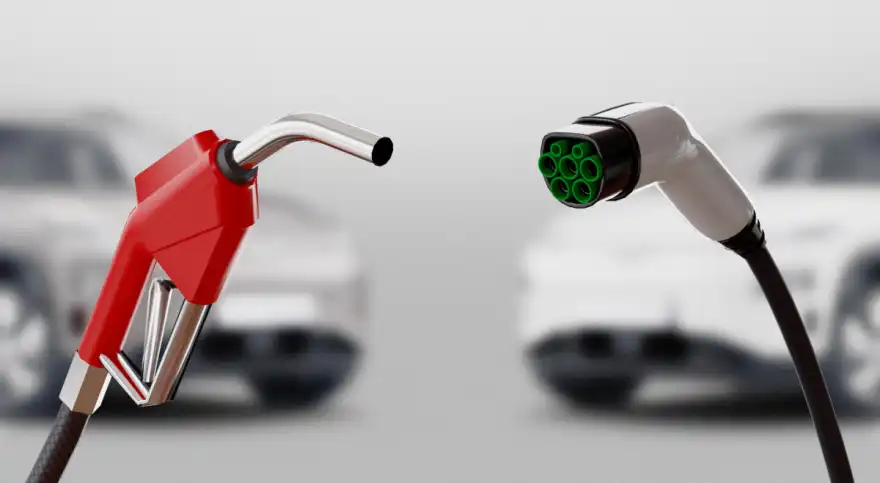
Recent data from Compare the Market shows that electric cars save you £528 annually compared to petrol cars. This is mainly due to their current exemption from road tax and lower fuel costs.
But will this cost advantage remain? Let’s delve into upcoming changes to road tax and compare electricity and petrol prices.
2024 electric vs petrol car costs overview:
Here's a breakdown of the cost differences between running an electric car and a petrol car in the UK:
Purchase Price: EVs generally still carry a higher price tag compared to similar-sized ICE cars, though EV prices are gradually decreasing.
Road Tax: Currently, fully battery electric vehicles (BEVs) in the UK are exempt from road tax, potentially saving owners hundreds of pounds annually. This exemption will change in April 2025.
Electricity vs Fuel Prices: Over the past year, both electricity and fuel prices have risen, impacting the cost of charging a battery and filling a petrol tank.
Maintenance: Data indicates that EVs typically incur lower service and maintenance costs compared to petrol cars.
Clean Air Zones: Several UK cities have implemented clean air zones where vehicles failing to meet minimum emissions standards must pay a daily charge (e.g., London's Ultra Low Emissions Zone). EVs are exempt from these charges, whereas some petrol and diesel cars may be subject to them depending on the city.
Check your car's ULEZ exemption status here to avoid unexpected fines.
These factors highlight the financial considerations between choosing an electric car or a petrol car in today's market.
Increasing costs of road tax
The Vehicle Excise Duty (VED), commonly known as road tax, requires owners of petrol, electric, and other types of cars to tax their vehicles annually. As of 2024, electric vehicles (EVs) are exempt from paying road tax but still need to be registered for it. They are also exempt from the Expensive Car Supplement, which applies to new internal combustion engine (ICE) cars with a listing price above £40,000.
However, starting April 1, 2025, new road tax rules for zero-emission EVs will be implemented. Like petrol and diesel cars, new EVs with a sale price over £40,000 registered after this date will have to pay the Expensive Car Supplement. This will be in addition to the £180 standard rate of road tax, which EVs will begin to pay from this date.
For example, if you purchase a new EV on April 1, 2025, with a listing price of £45,000, you will be required to pay:
- £180 in road tax annually
- From the second year, £390 annually for the Expensive Car Supplement, for a total of five years
- A first-year rate of £10
The first-year rate applies to any new car purchased and can significantly impact your first-year ownership costs. While the rate will be capped at £10 for EVs, ICE cars can pay up to £2,605, depending on their CO2 emissions.
So, if you plan to buy a new electric car from April 1, 2025, you should expect costs similar to those of buying a new low-emission petrol or diesel car.
Increasing costs of electricity and petrol
Since the introduction of the energy price cap on January 1, 2019, the cost per kWh unit of electricity has risen by 68%, from approximately 17p to 28.62p over five years. In comparison, petrol prices have increased by about 13% during the same period.
Various external factors have contributed to the upward trend in energy costs in recent years. Despite this increase, using electricity remains generally more cost-effective for drivers compared to petrol fuel.
Tip: To maximise savings as an EV driver, prioritise using your home charger whenever possible, as this is typically the most economical way to recharge your battery.
Factors affecting electric and petrol car costs
You can lower the running costs of an electric car by taking advantage of available government grants. If you own a flat or rent one with dedicated off-street parking, you could receive up to £350 towards the purchase and installation of a home charge point.
Car manufacturers are actively developing alternatives to the current lithium-ion batteries used in EVs. One promising alternative is the solid-state battery, which has the potential to significantly increase the capacity of electric vehicles. Toyota has suggested that solid-state batteries could be cheaper to manufacture than current EV batteries, potentially reducing electric car prices and expanding their accessibility.
Considering the UK's upcoming ban on new petrol car sales in 2035, it’s important to evaluate the potential savings and future-proofing benefits that an electric car can provide.




